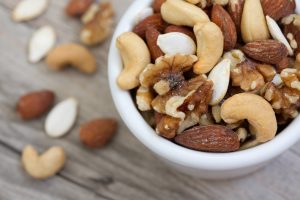 As you walk along the street during any summer carnival, it’s no doubt you’ll take in the sweet smell of cotton candy and the fragrance of fried foods like funnel cakes and fries. These fried foods can hold so many memories for many of us spending time with family and friends. Not to mention that such treats can taste delicious. However, recent studies show that the more you eat fried foods, the higher your heart disease and stroke risk.
As you walk along the street during any summer carnival, it’s no doubt you’ll take in the sweet smell of cotton candy and the fragrance of fried foods like funnel cakes and fries. These fried foods can hold so many memories for many of us spending time with family and friends. Not to mention that such treats can taste delicious. However, recent studies show that the more you eat fried foods, the higher your heart disease and stroke risk.
Heart disease and stroke facts
Besides being one of the leading causes of death in the United States, diseases of the heart come in many forms. However, it’s cardiovascular disease or conditions that involve narrowed or blocked blood vessels that are most dangerous. Such conditions include heart attack, angina (chest pain), or stroke.
Stroke is also in the top five leading causes of death in the United States and is also related to a vessel condition. It occurs when blood flow in the artery that supplies blood to the brain is blocked. Less commonly, a stroke can occur when this artery leaks or ruptures.
Fried foods and heart disease
Fried foods can taste good and can be purchased at a lower cost than healthier convenience food options. However, the long-term cost of eating such foods can be high. This is because eating such foods on a regular basis can place your heart health at risk.
Foods that are fried contain high amounts of saturated and sometimes trans fats. Research shows that when such fats in the diet are replaced with unsaturated fats, heart disease risk is reduced.
In fact, a recent study looked at the effect of fried food intake on heart disease and stroke risk. Study results show that those people who ate fried foods one to three times a week had a 7% higher risk of heart attack and stroke compared to those who ate fried foods less than once a week. Also, those people who ate fried foods daily had a 14% higher risk of such conditions.
Other ways you can lower heart disease and stroke risk
Besides reducing fried food intake, there are other things you can do to lower your heart disease and stroke risk. Use the following tips to help your heart be at its healthiest.
- Eat more fruits and vegetables: Consuming a colorful array of fruits and vegetables can help provide antioxidants to the body. Each color of the rainbow of produce contains different antioxidants that can provide varying health benefits to the body. Overall, having plenty of antioxidants in the diet can reduce inflammation in the body and lower risk of chronic diseases like heart disease.
- Sleep enough each night: Research shows that poor sleeping patterns can increase risk of heart disease and stroke. The National Sleep Foundation recommends that most adults sleep seven to nine hours each night. If you find you’re having trouble sleeping, it may be helpful to visit your doctor for treatment. They could recommend a sleep study to help identify any health issues that could be disturbing your sleep.
- Manage stress: Too much stress can have an impact on your heart health. Therefore, be sure to manage your stress with some relaxation breathing, meditation, yoga, or talking to a counselor each week.
- Visit your doctor regularly: It’s important to visit your doctor at least once a year to check your numbers. Your numbers include cholesterol, triglycerides, blood glucose levels, blood pressure, and body weight. These numbers can help identify any heart health risk factors you may have. The earlier you find such risk factors, the earlier you can receive treatment and prevent your risk of stroke.
- Take supplements when necessary: If you are lacking certain vitamins or minerals in your diet, you may need a supplement such as a multivitamin or fish oil. Supplements could help your body receive the antioxidants you need to fight oxidative stress and lower chronic disease risk factors. One such supplement is Circova by Vita Sciences. Circova contains ingredients like L-arginine, niacin, and hawthorne to help promote improved blood flow and blood pressure.
-written by Staci Gulbin, MS, MEd, RD
References:
Centers for Disease Control and Prevention (May 3, 2018) “About Stroke.”
Gordon, S. (July 11, 2019) “More evidence fried food ups heart disease, stroke risk.”
Houston, M. (February 2018) “The relationship of saturated fats and coronary heart disease: fa(c)t or fiction? A commentary.” Ther Adv Cardiovasc Dis., 12(2):33-37.
Koo, D. L., Nam, H., Thomas, R. J., & Yun, C. H. (2018). Sleep Disturbances as a Risk Factor for Stroke. Journal of stroke, 20(1), 12-32.
Mayo Clinic (March 22, 2018) “Heart Disease.”
Medline Plus (last reviewed December 26, 2017) “Antioxidants.”
National Sleep Foundation (accessed October 30, 2018) “National Sleep Foundation Recommends New Sleep Times.”

 An essential part of a heart healthy diet is plenty of plant-based unsaturated fats. Not only do plant-based foods provide heart-healthy fiber, but they are also rich in antioxidants. These antioxidants can help reduce inflammation in the body, and in turn reduce chronic disease risk. One such group of antioxidants are the omega-3 fatty acids found in such foods as avocado, plant-based oils and fatty fish. Recent research shows that these healthy fats may be able to help with mental health. A recent study shows that by increasing the amount of healthy fats in your diet, you could help reduce symptoms of anxiety.
An essential part of a heart healthy diet is plenty of plant-based unsaturated fats. Not only do plant-based foods provide heart-healthy fiber, but they are also rich in antioxidants. These antioxidants can help reduce inflammation in the body, and in turn reduce chronic disease risk. One such group of antioxidants are the omega-3 fatty acids found in such foods as avocado, plant-based oils and fatty fish. Recent research shows that these healthy fats may be able to help with mental health. A recent study shows that by increasing the amount of healthy fats in your diet, you could help reduce symptoms of anxiety. The Greek-style diet has long been touted as one that is full of heart healthy benefits. These benefits are thought to stem from the vast array of healthy fats from plant-based sources and limiting of saturated fats from red meats as well as the rich source of fruits and vegetables in this Mediterranean regimen. However, the health benefits may extend much further than initially realized. A recent study shows that the Mediterranean diet may help to lengthen life of older adults.
The Greek-style diet has long been touted as one that is full of heart healthy benefits. These benefits are thought to stem from the vast array of healthy fats from plant-based sources and limiting of saturated fats from red meats as well as the rich source of fruits and vegetables in this Mediterranean regimen. However, the health benefits may extend much further than initially realized. A recent study shows that the Mediterranean diet may help to lengthen life of older adults. Heart disease is the leading cause of death for men and women in the United States. It accounts for one in four deaths each year. However, yo can prevent heart disease by changing some lifestyle factors to lower your risk. Risk factors of heart disease include poor diet, physical inactivity, being overweight or obese, being a smoker, and having diabetes. Fortunately, by working to change a few things in your daily routine, you can lower your risk of heart disease. Here are the top five things you can do today to lower your risk of heart disease.
Heart disease is the leading cause of death for men and women in the United States. It accounts for one in four deaths each year. However, yo can prevent heart disease by changing some lifestyle factors to lower your risk. Risk factors of heart disease include poor diet, physical inactivity, being overweight or obese, being a smoker, and having diabetes. Fortunately, by working to change a few things in your daily routine, you can lower your risk of heart disease. Here are the top five things you can do today to lower your risk of heart disease. Eat your veggies, they say. Whether you are trying to lose weight, improve your blood pressure, or just simply trying to live well, you may be told to eat more fiber in your diet. Fiber is not only good for managing weight or keeping your heart healthy though. A recent study has found that more fiber in your diet may actually help improve the health of those with type 2 diabetes.
Eat your veggies, they say. Whether you are trying to lose weight, improve your blood pressure, or just simply trying to live well, you may be told to eat more fiber in your diet. Fiber is not only good for managing weight or keeping your heart healthy though. A recent study has found that more fiber in your diet may actually help improve the health of those with type 2 diabetes. Like millions of other people, you may be hoping to lose some weight in this new year. However, the confusing part may be what eating plan, or shall I say “diet,” should you choose to follow? There is so much information in the media today making all sorts of weight loss claims. They may all seem promising, but not all may provide you the nutrients you need to succeed long-term. However, a recent report found that the DASH diet may be the answer to get you to your weight loss goal.
Like millions of other people, you may be hoping to lose some weight in this new year. However, the confusing part may be what eating plan, or shall I say “diet,” should you choose to follow? There is so much information in the media today making all sorts of weight loss claims. They may all seem promising, but not all may provide you the nutrients you need to succeed long-term. However, a recent report found that the DASH diet may be the answer to get you to your weight loss goal. If you have ever tried to lose weight, then you probably have been told to track your calories. Most calorie trackers focus on keeping track of the calories you consume through food. On the other hand, fitness trackers or workout machines may track how many calories you burn during the day. However, is there more to the story of weight loss, or is calories in and calories out the only key to success? A recent report by health experts reveal that there may be more than simple math in the weight loss equation.
If you have ever tried to lose weight, then you probably have been told to track your calories. Most calorie trackers focus on keeping track of the calories you consume through food. On the other hand, fitness trackers or workout machines may track how many calories you burn during the day. However, is there more to the story of weight loss, or is calories in and calories out the only key to success? A recent report by health experts reveal that there may be more than simple math in the weight loss equation. When you hear about brain health, you may think of lowering stress and anxiety. However, having a healthy brain also involves reducing risk of stroke as well as memory conditions like Alzheimer’s and dementia. A recent report has found that keeping your body healthy is vital to keeping your brain healthy.
When you hear about brain health, you may think of lowering stress and anxiety. However, having a healthy brain also involves reducing risk of stroke as well as memory conditions like Alzheimer’s and dementia. A recent report has found that keeping your body healthy is vital to keeping your brain healthy. Do you skip breakfast? Does your busy schedule make it hard to eat in the morning? Are you just not hungry in the early hours of the day? You may have heard that breakfast is the most important meal of the day. Recent research has found that this may be true. Skipping your morning meal can deprive your body of many important nutrients vital to overall health.
Do you skip breakfast? Does your busy schedule make it hard to eat in the morning? Are you just not hungry in the early hours of the day? You may have heard that breakfast is the most important meal of the day. Recent research has found that this may be true. Skipping your morning meal can deprive your body of many important nutrients vital to overall health.